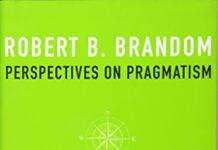
Ebook Info
- Published: 2009
- Number of pages: 248 pages
- Format: PDF
- File Size: 0.98 MB
- Authors: Robert B. Brandom
Description
Transcendentalism never came to an end in America. It just went underground for a stretch, but is back in full force in Robert Brandom’s new book. Brandom takes up Kant and Hegel and explores their contemporary significance as if little time had expired since intellectuals gathered around Emerson in Concord to discuss reason and idealism, selves, freedom, and community. Brandom’s discussion belongs to a venerable tradition that distinguishes us as rational animals, and philosophy by its concern to understand, articulate, and explain the notion of reason that is thereby cast in that crucial demarcating role.An emphasis on our capacity to reason, rather than merely to represent, has been growing in philosophy over the last thirty years, and Robert Brandom has been at the center of this development. Reason in Philosophy is the first book that gives a succinct overview of his understanding of the role of reason as the structure at once of our minds and our meanings—what constitutes us as free, responsible agents. The job of philosophy is to introduce concepts and develop expressive tools for expanding our self-consciousness as sapients: explicit awareness of our discursive activity of thinking and acting, in the sciences, politics, and the arts. This is a paradigmatic work of contemporary philosophy.
User’s Reviews
Reviews from Amazon users which were colected at the time this book was published on the website:
⭐Brandom’s most accessible and philosophically inspiring book, Reason in Philosophy explicates the implications of his earlier work for social, political, and other domains of philosophy in a way that is far more accessible than anything he has written to date. Of even greater interest, this book includes essays on philosophy itself … what it means, its political relevance, etc., that are inspiring must reads for everyone engaged in philosophical inquiry.
⭐In this book, Robert Brandom focuses on the 18th century German philosopher Immanuel Kant’s epistemological shift from what Brandom describes as a descriptive paradigm to a normative one. What we can know, on this normative view, is a function of what we can say, that is, what we are equipped to say, and, for Kant, Brandom tells us, this depends on the ways in which our thinking processes work. For Brandom it is here that we can find the precursor to the later pragmatic turn in philosophy, as exemplified by the American pragmatists Peirce, James and Dewey and as later found in Wittgenstein and even Heiddegger. For Brandom the line of thinking begun by Kant took more definitive form and saw substantial improvement in the work of Hegel who added to Kant’s picture the idea of intersubjectivity, of knowing as doing within the context of a community understood as the interplay of separate subjects in joint enterprises with a history that is known by and matters to its participants and so informs their present and future behaviors. We are not only engaged with our contemporaries but with those who came before us and will come after .His arguments as to Hegel’s contributions to the initial Kantian revolutionary idea of knowing as doing are interesting, but it’s his argument that the ordinary discursive ways we have of speaking about things, which express our intentionality (knowing about things), depend on knowing how to speak and operate in the world, that is most intriguing, I believe. Here he seems to be saying that, behind the logic we ordinarily recognize re: making assertions (with their true and false relations), there is also a logic, a deeper logic, of behavior itself, i.e., a logic of authority (of granting rights, to claims and claimants, to demand or expect certain outcomes) and of obligation (of accepting the responsibility to act in the ways expected). This is the logic of recognizing implications by acting on them, a logic of reciprocal relations.For Brandom having a language is the key to having concepts and having concepts is what differentiates us from other sentient creatures. That is, we are not merely sentient, as he puts it, but sapient for we have the ability to think about things, to be intentional in ways that other creatures do not. But concepts, he argues, are not stand alone ideas we have. They exist, as such, only within a network, a kind of logical space, of a system of inferences. That is, on his view, in order to hold an idea in our heads (which we can do but other animals, as far as we know, cannot), we must be able to follow rules of inference which involve recognizing that some statements follow from other statements and that they imply others. A statement or claim must be able to be both a premise for some conclusion and a conclusion itself when the circumstances call for that; it must be capable of serving both kinds of functions for it to have conceptual meaning. Our job as language speakers, then, is to know how to use statements in these different ways when circumstances call for it, to know the rules under which a statement supports something or is supported by something else. We must not only be able to speak in these various ways but to behave in accordance with the inferential relationships expressed by our statements, when it is apt to do so.That is, we must recognize when there is compatibility between claims and when there is incompatibility and to do that we must be able to act in relation to those conditions because only acting thus expresses the recognition of these relations. Therefore, says Brandom, language itself is a network of things we do, rules we follow. And this implies relations of certain kinds within which what we know takes on meaning. In this way, Brandom asserts that pragmatism provides the basis for explaining what it is to know anything.Representing things in the world is, thus, not a matter of picturing things but of doing things (finding common ground here with the later Wittgentein). Ideas occur only insofar as they connect with an entire web of other ideas and those connections are dictated by the relations of inference. Thus, again, he argues that our familiar logic of discursive thought is built on a logic of inferential rules of behavior (including, of course, verbal behavior) and that this is a deeper kind of logic than the sort we ordinarily recognize when we think of the logic of argument or of formal logic of the sort Russell pioneered.This has important implications both for Artificial Intelligence research and for understanding our actual ways of thinking and speaking. It’s especially interesting from a moral standpoint because moral valuation is about normativity (doing things according to rules) and, if Brandom’s analysis is right, this is a more basic mode of operation than descriptive/objective assertions which are the stuff of the sciences and which ordinary logic lays out the rules for. If normative elements are more basic, as he thinks, than descriptive elements, then the normative nature of moral discourse is not undermined by its failure to find support in descriptive discourse (is’s yielding oughts).While Brandom does not dismiss the elements of the mental lives that we have when we know things (the mental imagery of our thoughts, say,) he is less concerned about that than with the way in which a logic of inferentialism, consisting of expressions of behavioral dispositions, underlies the logic of descriptive language. An important addition to understanding Brandom, I think, is to note that he argues that assertoric language is necessary for any language to qualify as that, i.e, it is, as he puts it, the “downtown” of human cognition, i.e., no language which lacks the capacity to describe by assertion can be anything more than a signaling enterprise in his view. In this, he acknowledges diverging from Wittgenstein who, he points out, held that language was just an amalgam of various, different games (rule governed things we do with sounds) without any essential ingredient that all the games must have in common. For Brandom, on the other hand, the pragmatic dynamic underlies the assertoric but the assertoric must be present in any language for language to be that and for we humans to be what we are.In the latter part of the book, Brandom turns to ethics and here he adopts a strategy that builds on the classical notion of the good life as in that which is seen to be most conducive to human flourishing, i.e., what is good for human beings as human beings determines the morally good things we should do. Brandom grounds this view in his more basic claim that epistemic capacity stands on normative activity, i.e., that ‘knowing that’ is a species of ‘knowing how.’ Taking this from the Kantian conception of knowledge as a function of human capacities, of the conceptual structures we have, and those capacities as instances of how we relate to statements (recognizing their inferential dimension in terms of what they authorize and obligate us, as language speakers, to do), he goes on to suggest that this normativity runs all the way down. That is, he makes the distinction between sentience and sapience, arguing that sapience, what humans have uniquely in the animal kingdom (as far as we currently know) rests on but qualitatively changes the underlying sentience.Where sentience, Brandom suggests, is the state of having sensations, sensory information, feelings — of being aware, sapience is the state of having the capacity to conceptualize and so think ABOUT the things we experience as sentient creatures. At least in the case of creatures like ourselves, he argues, sapience, which he describes as fundamentally normative (a matter of learning to follow and following rule-sets) rests on the sentience we have but radically alters its nature. Hence, he concludes, determining what is the good life for humans must rest on discovering what is good for sapient creatures, not just sentient ones, and from this he rules out the idea of merely physical pleasure, however happy it may make an organism, as the right sort of objective for a sapient creature to pursue. What is good for humans as sapients, then, is to exercise most fully the elements of which that sapience consists.Brandom argues, and here one might suppose some special pleading appears to have entered his calculus, for the life of the mind and, specifically, for philosophical inquiry as the highest sort of good at which humans might aim. To live a good life is then, on this view, just to exercise one’s sapient capacities most fully and in a way that is maximally satisfactory to sapient creatures. For Brandom, this is the life of the mind and, specifically, the life of the contemplative mind as lived by philosophers. And here, one is tempted to say, he has gone astray in accounting for whatever it is we think morally good for he has failed to offer a means by which those who are not so blessed (with conceptual capacities akin to his own) can live the right sort of life. More he has not shown how living such a life, or pursuing it, leads to what we generally take to be morally good choices.If moral valuing is about doing the right thing vis a vis other creatures in the universe, and surely that is what it seems, intuitively at least, to be about, then there remains a gap in Brandom’s account. It cannot be enough, from a moral perspective, for any of us to live our lives like philosophers in order to be ethically better off for what of those, among us, who cannot do so? Are they without any moral capacities of their own then? Can they not hope to act morally on their own recognizance (the only way a truly moral act can count as moral)? More, how many moral problems, as we find them in our daily lives, really seem to rest on the belief in the desirability of living like a philosopher?Brandom suggests that the way a focus on what is good for human beings (as in what human beings ought to pursue, based on what they are) yields familiar moral claims (such as don’t commit murder or don’t steal or cheat or lie, etc.) and this happens through, as he proposes, adopting the idea that, for a fully rational being, the best way to live, amounts to embracing a Kantian argument (that there is a categorical imperative governing our practical judgment which obliges us, if we are following it, to treat others as we would ourselves be treated). Given that the good life for a person is the one that most fully exercises (realizes?) his or her sapience, we would find in such full exercise, subscription to the Kantian notion that no one’s interest is, in principle, more important than anyone else’s and therefore a fully rational being will embrace Kant’s categorical imperative or something very much like it.Yet the “highest” form of the rational life, which Brandom alludes to, that of doing philosophy in an exhaustive way (not just, say, as a dilettante), necessarily remains highly specific to a small class of human beings and surely we don’t want to say that only that class of humanity has the opportunity to live the good life as so conceived, and so to be maximally ethical in their behaviors. Of course, Brandom softens this somewhat by suggesting that this is a goal toward which all rational beings, to the extent they have sufficient intellectual capacity, will choose to move because, having such sufficient capacity, they will recognize this as being intrinsically part of being maximally rational — and a rational being would want to maximize his or her rationality. But this assumes that they already embrace a goal to maximize one’s rationality and that seems circular which undermines a moral argument to do certain kinds of actions and refrain from others. More, why shouldn’t a rational being have other rational aims that even, in some circumstances, rationally recognize certain times in which it is better not to rely on an extensive rational calculus to choose one’s acts?Perhaps some circumstances call for the rational being to set aside his or her rationality, if only for the moment? But then being rational must be seen to depend on what anyone means by “rational,” whether it’s to be so broadly construed as to allow for seemingly irrational acts in some cases or if it can only denote a person who is always and in every case a rational calculator of outcomes.This is a problem for Brandom’s account, I think, as much as for Kant, whose formula for ethical behavior he seeks to enlist in his own cause. Nor can rationality, itself, be argued for since only someone who is already rational can see the point of an argument to BE rational. So if such an argument (to be rational in the way Kant envisions) is not natural to us but subject to decision by each of us, and such rationality underlies genuine moral claims, then moral judgments must stand outside a framework of reasons. And this is contrary to the game of moral discourse itself since even Brandom would agree that ethical discourse, being normative, is about giving reasons.Brandom has, I think, correctly pointed out that knowing about things has a normative ground and that normativity goes all the way down in us. And this does have an important implication for explaining and justifying many of the things we do, as well as how we make moral claims and judgments, and, indeed, how they work. To account for moral valuing we need an explanation which analyzes and expresses moral claims in terms of what we do at the most basic level to produce awareness of this or that in creatures like ourselves, including awareness of the things such creatures count as morally good or right.But it does not seem to be enough to suppose that being moral (as in looking out for others’ interests in at least an equivalent way with how we look after our own, the paradigmatic moral case) can rest on merely recognizing a life of contemplative activity as being best for creatures like ourselves. If to make a moral choice is, paradigmatically, to subordinate our own interests to those of others, an approach like Brandom’s, which hinges on assigning the highest possible value in human pursuits to living the purely contemplative life, as philosophers do it, doesn’t get us there.
⭐excellent
Keywords
Free Download Reason in Philosophy: Animating Ideas 1st Edition in PDF format
Reason in Philosophy: Animating Ideas 1st Edition PDF Free Download
Download Reason in Philosophy: Animating Ideas 1st Edition 2009 PDF Free
Reason in Philosophy: Animating Ideas 1st Edition 2009 PDF Free Download
Download Reason in Philosophy: Animating Ideas 1st Edition PDF
Free Download Ebook Reason in Philosophy: Animating Ideas 1st Edition



